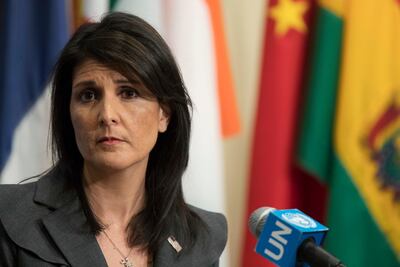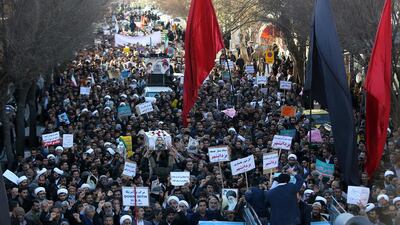Thousands of Iranians took part in pro-government rallies in several cities on Wednesday in a state-sponsored show of force after six days of street unrest that has shaken the clerical leadership and left 21 people dead.
After almost a week of anti-government sloganeering, the Iranian regime tried to put on its own show of supposed people power. State media showed footage of pro-government demonstrations in cities across the country, with people carrying images of supreme leader Ayatollah Ali Khamenei and chanting, "Death to American mercenaries".
The English-language Press TV broadcast the rallies live, calling them a protest against "the violence that has taken place over the last few nights" — with no mention of what might be behind the alleged violence. State media said people of all ages joined in the pro-government rallies but television images showed mostly middle-aged and older men.
The head of Iran's Revolutionary Guard announced the defeat of "sedition" in the country.
"Today, we can say that this is the end of the 96 sedition," said Major-General Mohammad Ali Jafari, referring to 1396, the current year according to the Persian calendar. He said "security preparedness and people's vigilance" had defeated the nation's "enemies" with the Guard intervening only in a "limited way" in three provinces, and insisted the number of "troublemakers" never exceeded 15,000 nationwide.
___________________
Read more:
Why we shouldn’t jump to conclusions about what is happening in Iran
Officials says US seeks change in Iran’s behaviour, not regime change
Beyond the Headlines podcast: Iran’s long history of protests and civil unrest
___________________
Bizarrely, he blamed former US secretary of state Hillary Clinton — along with pro-monarchists and anti-revolutionary agents — for stirring up the protesters. There were forces "announced by Clinton to create riot, anarchy, insecurity and intrigue in Iran," the general said. He also blamed a "former official," believed to be a reference to ex-president Mahmoud Ahmadinejad, who has been critical of the current leadership.
However, the anti-government unrest shows no sign of abating and appears to be branching out of Iran's urban centres into smaller towns in the countryside. With the internet blocked, it is difficult to confirm what is happening but images and posts are still appearing on social media. One unconfirmed report said three policemen had been killed in West Azerbaijan province.
President Donald Trump on Wednesday said the US would throw its support behind those protesting in Iran at an "appropriate time," his latest in a string of tweets on the protests.
"Such respect for the people of Iran as they try to take back their corrupt government. You will see great support from the United States at the appropriate time!" Mr Trump wrote in a post on Twitter.
Other leaders who have expressed support for the protesters include Israel's prime minister Benjamin Netanyahu and the German leadership. "The federal government considers it legitimate when people courageously protest their economic and political woes on the streets as is happening in Iran at the moment and they have our respect," said government spokeswoman Ulrike Demmer.
And in the capitals of Europe, the Iranian diaspora held their own small-scale demonstrations in front of Iran's embassies in Britain, France, Italy, Germany and Austria. In Paris, about 40 people gathered near the Iranian embassy to call for an end to Tehran's "interference" in Syria and Lebanon, which Afchine Alavi, from the National Council of Iranian Resistance said. And in Berlin, around 100 regime opponents demanded the immediate release of people arrested during three days of protests.
Back in Tehran, Iran's minister of labour and social affairs Ali Rabei said the government had to bear some blame for the public's dissatisfaction, according to the official Islamic Republic News Agency.
“We are all responsible when it comes to recent events,” he said. “The government and authorities will listen to people’s demands and will make every effort to materialise them.”
Iranian president Hassan Rouhani found some support from Turkey's president Recep Tayyip Erdogan who in a phone call told him he was right to say protesters should not break the law while exercising their right to demonstrate peacefully.
The US called for an urgent session of the UN Security Council and the Geneva-based Human Rights Commission to discuss the events unfolding in Iran, now in their eighth day. The US ambassador to the UN Nikki Haley urged the international community to speak out.

“The people of Iran are crying out for freedom. All freedom-loving people must stand with their cause,” she said. "The freedoms that are enshrined in the United Nations charter are under attack in Iran. Dozens have already been killed. Hundreds have been arrested. If the Iranian dictatorship's history is any guide, we can expect more outrageous abuses in the days to come."
She also rejected as "complete nonsense" statements by Iranian supreme leader Ayatollah Ali Khamenei accusing Tehran's "enemies" of provoking the protests, which first erupted on December 28 and have resumed after nightfall every day since.

